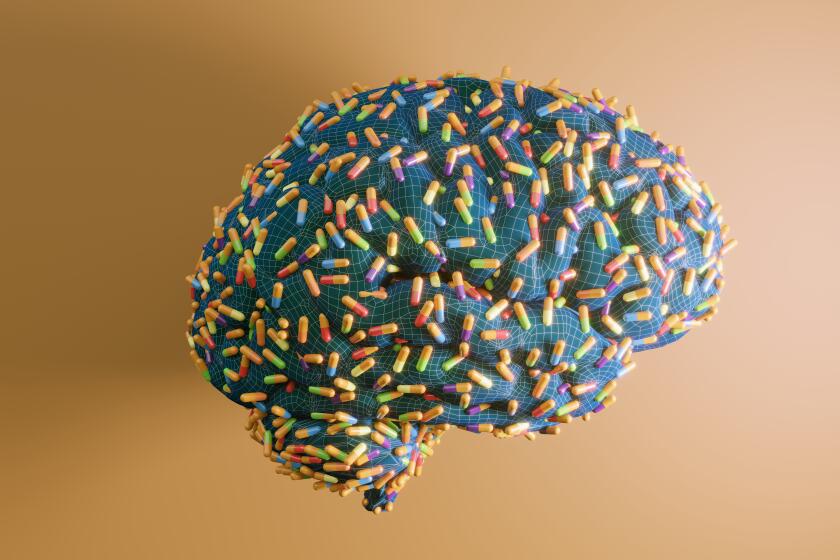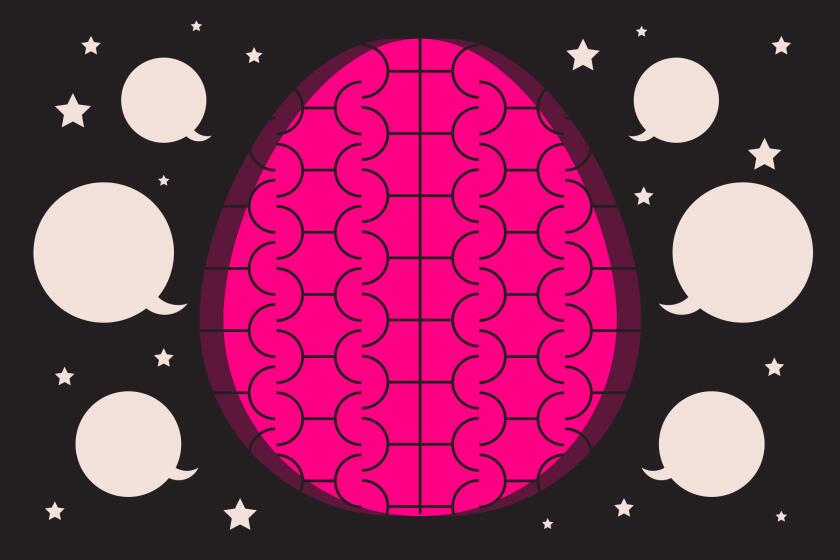Opinion: Depression and insomnia are part of my family history. Will my kids be OK?

- Share via
I’ve longed for sleep all my life. Getting more sleep has been one of my New Year’s resolutions for decades. Recounting stories of my early childhood insomnia, my mother would describe how I’d lie in bed, wide-eyed, hyperactive and insistent on making my presence felt at all hours.
I was awake begrudgingly, gripped by fear and panic, devising strategies to appease my spiraling mind. Counting sheep? For amateurs. I needed my back against a wall, blankets pulled up to my chin, white noise humming, the door slightly ajar and a night light casting a comforting glow.
After a quick goodnight hug from my parents, I commenced my nightly ritual: imagining all the ways my family might meet its demise, planning my response to a potential intruder, fixating on shadows, urging them not to form terrifying shapes from my nightmares. This process took hours. It still does, except now it’s compounded by both the imagined and real terrors accompanying motherhood.
I couldn’t control my depression and anxiety. But I worried that taking medication would be cheating on my sobriety.
When I became a mother, I began to reckon with how anxiety and depression were passed down in my family like an heirloom. I remembered how as a child, on many late nights, I’d slip into the kitchen for a glass of water or head to the bathroom, willing the cycle of sleeplessness to break.
The eerie flicker of midnight infomercials illuminated my dad dozing on the couch, lit cigarette in hand. The couch bore the scars of countless burns, with tiny holes forming constellations across the fabric. I’d delicately remove the cigarette, extinguish it in the nearby ashtray and turn off the TV and lamp. I felt neither anger nor fear, only relief seeing him at peace, no longer hunched over his desk, stressed and anxious about his struggling business or our finances. During that time, the term “mental illness” had not yet been mentioned in our household.
In 1950s Texas, my father was born as the only child to a couple who became parents later than was typical for their generation and region. Although my grandmother’s “manic depressive disorder” was occasionally mentioned, it was never openly discussed. Likewise, my father’s diagnosis, which I now understand to be bipolar disorder, wasn’t a subject of much attention. As for my mother, sister and me, we were like passing ships to his dimming, stationary lighthouse, seldom acknowledging his struggles as we carried on with the routines of family life.
When I, at age 15, couldn’t bear insomnia any longer, a psychiatrist prescribed Ambien. In the evenings, my dad would enter my room, asking if I could spare just one pill because he’d depleted his own supply. My mom cautioned me against sharing medication with him, but I could see the weariness in his eyes. It was that of a man worn down by decades of untreated mental illness, grappling with the unfiltered and ceaseless activity of a mind hellbent on distorting reality. It was no wonder he turned to abusing his pain medication. It was no wonder I inherited addiction.
One of the paradoxes of sleep is that the more we fixate on getting it, the less likely we are to achieve it.
It’s not unique to be tired. As a 30-something mother of three, I know this because among the parents I speak to, trading remarks about exhaustion is our standard mode of communication. But a distinct fatigue accompanies mental illness. It’s exhaustion from trying to quell irrationality and intrusive thoughts, to remember to perform basic tasks and self-care. It’s the mental strain of distinguishing what’s real from what’s not.
As an adult, I’ve found sleep at the bottom of wine bottles, in the rotating combinations of sleep aids — over-the-counter, prescription and illicit. I’ve found it in ways that brought me close enough to death to feel like rest. This yearning for respite eventually caught my dad, too, who burned one final hole into our couch the day he died, his heart finally giving out after years of declining health and medication abuse.
When I asked my husband what he thinks about when he lies down at night, he replied simply, “Nothing.”
Nothing? He doesn’t second-guess his actions or words, anticipate tomorrow’s concerns, descend into despair or review his to-do list for the next day. Simply, nothing. He can nod off mid-conversation, in well-lit, noisy rooms and during dental cleanings or MRI sessions. I’ve come to understand that, for many, no specific ideal conditions are required for sleep.
Our son is among those people. Unencumbered by the curse like his father, he snores loudly, audiobooks blasting on his Kindle, headphones resting halfway off his ears.
Science shows that heartbreak doesn’t just hurt emotionally. It can affect our brains and immune systems. I asked researchers if science could also mend my broken heart.
But our eldest child upholds my side of the family’s tradition. Our tween daughter needs a meticulously crafted bedtime routine that includes deep breathing, positive mantras and melatonin, among other steps. I hold her hand and we breathe in, breathe out. She asks if it’s always going to be this way, to be this hard to sleep. “Is there something wrong with me?” She wants to know.
In these moments, I feel guilt and frustration. But I envision our family’s anxiety as a succession of Russian nesting dolls, each generation’s smaller as we gradually develop the skills to shrink them.
Skills I didn’t learn until adulthood, my daughter now has at 11. While my parents opted for silence, leaving symptoms unnamed, my children possess an almost encyclopedic understanding of the connections between body sensations and emotions. In our home, at least, there are rarely thoughts or worries left unsaid. They know the family history. While we may never fully break the curse, I’m willing to do whatever it takes to minimize my children’s uncertainty and alleviate their fears.
As my daughter begins her meditation, the guide instructs, “Picture yourself as a vibrant and colorful bird resting on a tree.”
“Settle back into the nest of your tree. You are ready for a wonderful, peaceful sleep tonight,” the meditation guide continues. When I close my eyes, my feathers are being plucked. I’m a broiler chicken in a cramped, dark factory farm. I’m hanging upside down in a slaughterhouse, my throat slit. I’m a bird that cannot rest.
“Will it always be this hard?” my daughter asks repeatedly. It still is for me. But I hope that maybe, through our efforts, it won’t be like this for her forever.
Molly Wadzeck Kraus is a writer living in the Finger Lakes region of New York. She is working on a memoir about mental illness, addiction and motherhood.
More to Read
A cure for the common opinion
Get thought-provoking perspectives with our weekly newsletter.
You may occasionally receive promotional content from the Los Angeles Times.













